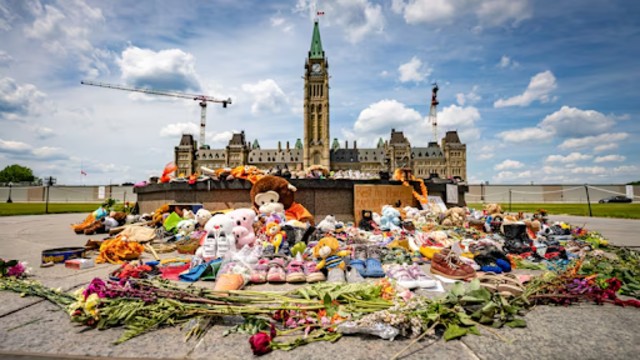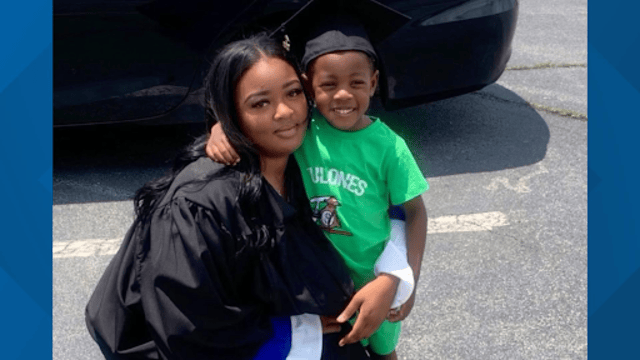
In June 2021, a temporary memorial was set up at the Centennial Flame on Parliament Hill in Ottawa to honor the children who lost their lives at the Kamloops Indian Residential School. Photo: CBC
The expert committee that helps Indigenous communities locate unmarked graves at former residential schools in Canada is losing its federal funding. This means the committee will stop working when its current funding expires on March 31.
"It's a betrayal," said Crystal Gail Fraser, a founding member of the committee. She is Gwich'in and grew up in Inuvik, N.W.T. "We are losing sight of our values around truth and reconciliation."
The decision follows funding cuts announced in July for unmarked grave searches. Delays in funding for the Survivors' Secretariat, a non-profit working on residential school investigations, were also reported.
History Behind the Committee
The committee was formed after 200 possible burial sites were discovered in 2021 at the former Kamloops Indian Residential School. The discovery made headlines worldwide, sparking outrage and renewed calls for accountability.
The National Advisory Committee on Residential Schools Missing Children and Unmarked Burials (NAC) is co-run by the National Centre for Truth and Reconciliation (NCTR) and the federal Department of Crown-Indigenous Relations.
In 2022, a year after the Kamloops discovery, the federal government promised to support Indigenous communities in their search for truth. That same year, Pope Francis visited Canada and apologized for the Catholic Church’s role in the schools.
Now, nearly three years later, the government is withdrawing financial support. "It’s shocking," Fraser said. "The government has always signaled its commitment to truth and reconciliation."
The Search for Truth Continues
Despite past promises, Fraser said this move is a disappointing way to mark the 10th anniversary of the Truth and Reconciliation Commission's (TRC) final report.
The TRC estimated that at least 3,200 children died in residential schools. Murray Sinclair, the commission’s chair, believed the number could be five to ten times higher due to incomplete burial records.
More than 100 Indigenous communities in Canada are involved in grave searches. Many struggle to access the information and resources needed.
"Losing NAC is a tremendous loss," said Raymond Frogner, senior director of research at the NCTR. The committee provided technical guidance, forensic support, and access to historical records.
Without it, communities may have to rely on private companies, which could be costly and limit control over their findings.
Indigenous Leaders React
Judy Gingell, chair of the Yukon Residential Schools Missing Children Project, said the decision is devastating.
"It feels like the government pulled the rug out from under survivors," she said. "It's cruel."
Many survivors recall heartbreaking losses. Elders remember children leaving for school in the fall and never coming home in the spring. "Our elders have no idea where the children are that passed," Gingell said.
Kukdookaa Terri Brown, a survivor guiding the committee’s work, said the timing is critical. "The technical work is done, we know how many children may be found," she said. "Now, the government is saying our lives don’t matter."
The government says it will continue funding Indigenous communities through the Residential Schools Missing Children Community Support Fund. But Brown isn’t convinced.
"It’s heartbreaking," she said. "These were babies who never felt their mother’s love. They probably died alone, and now in death, they’re still forgotten."















